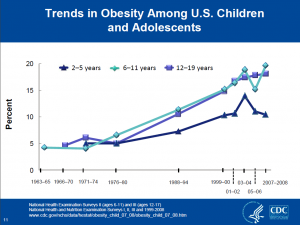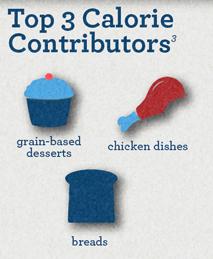Is obesity really leveling off? Yes, and falling in kids ages 2 to 5!
The biggest story—front page, right column—in the New York Times today is CDC’s report of a 43% drop in obesity among children ages 2 to 5 in the last decade.
- 2003-2004: 14%
- 2011-2012: 8%
A change this large is highly unusual.
The data come from a report in JAMA which found no change in overall obesity prevalence in that decade among infants and toddlers, youth ages 2 to 19, or adults. When looking at the data for subgroups, however, the authors found two exceptions:
- The big decline in obesity among children ages 2 to 5
- A big increase in obesity among women ages 60 and older (oops)
What to make of this?
The decline in obesity among young children is consistent with previous reports, although these showed a smaller change.
To examine what the data show, it helps to look at an illustration. The JAMA paper does not provide one, but a reporter sent me this:

The lower curve is for children ages 2 to 5. It shows a sharp uptick in 2003-2004 (what was that about?), followed by a decline in 2007-2008. The new data extend the decline a little further.
Any decline in the rising prevalence of obesity is cause for celebration. So is the no change in a decade among almost everyone else.
The reasons? I can only speculate but the “eat less junk food and move more” message must be getting out.






